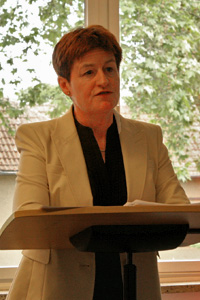
On 19 May ECLA welcomed Dr. Aileen Douglas of Trinity College Dublin, for a lecture on Jane Austen’s Emma.
As in other Austen novels, Emma explores the relationship between marriage and property, connecting the development of the characters and the unfolding plot with wealth and proprietary status. However, Emma represents an exception, in that the title character is a young woman whose secure financial position allows her freely to decide against marriage. As Aileen Douglas pointed out, this innovation by Austen means that the plot need not advance in accordance with the conventions of the novel of the period. Instead, Emma follows this self-sufficient heroine in her endeavors to fictionalize other people’s lives and emotional affairs. As a consequence, the plot emerges from Emma’s own profound errors in reading other people’s emotions and desires, as well as from a detailed evocation of typical social gatherings and bonds.
Secure in her fortune, and denying every implicit proposal of marriage, Emma looks for active engagement in the social world around her, by trying to secure marriage for Harriet, her new protégé, who, as an illegitimate child with no fortune, is relegated to a much lower social status than Emma. The independence that Emma strives for in opposing marriage, therefore, does not seem to be reinforced by the nature of her day-to-day activities and concerns. Yet at the same time, Emma’s plans for Harriet subvert the class and gender restrictions in force in her society. Aileen Douglas argued that Emma’s own eventual marriage also carries a double implication, since it may be interpreted as a capitulation to the demands of patriarchal society, and as an exercise of independence, since her new husband moves into her own family home.
Finally, addressing the question of the authorial example, Jane Austen’s own life seems to offer a possible embodiment of what independence might have meant for women of the late eighteenth and early nineteenth centuries. Austen herself never married. She dedicated her time instead to writing and exploring the social obligations of women in realistic novels which deploy free indirect speech in the portrayal of their characters’ psychology, as well as ironic and witty social commentary.
Dr. Aileen Douglas is a Fellow of Trinity College Dublin. She holds a Doctorate from Princeton University and for several years was part of the Faculty at Washington University in St. Louis. Her research and teaching interests are in the field of eighteenth-century writing, contemporary Scottish fiction and working-class fiction. Her publications include: Uneasy Sensations: Smollett and The Body (Chicago University Press, 1995) and Locating Swift: Papers from Dublin on the 250th Anniversary of the Death of Jonathan Swift with Ian Campbell Ross and Patrick Kelly, (Four Courts Press: Dublin, 1998).
by Livia Marinescu (’08, Romania)
